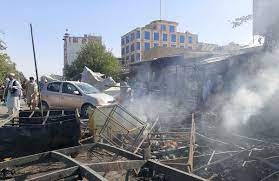Violence against children escalates in Afghanistan

At least 27 children have been killed in Afghanistan in three days amid fierce fighting between the Taliban and government forces, the UN has said.
The UN children's agency Unicef said it was shocked by the "rapid escalation of grave violations against children".
The Taliban have been making major advances across the country as foreign troops withdraw, taking six regional capitals since Friday.
They have rejected international calls for a ceasefire.
More than 1,000 civilians have been killed as a result of the conflict in the past month.
In a statement on Monday, Unicef said the atrocities being committed against children were growing "higher by the day".
The 27 fatalities were recorded across three provinces - Kandahar, Khost, and Paktia. Some 136 children were also injured in these areas over the past three days, Unicef said.
"Afghanistan has long been one of the worst places on Earth to be a child but in recent weeks and, indeed, the last 72 hours, that's got a lot worse," Unicef Afghanistan's Samantha Mort told the BBC.
Children have been killed and injured in roadside bombs and in the crossfire. One mother told the group that her family were asleep over the weekend when their home was hit by shrapnel, which started a fire and left her 10-year-old son with "horrific burns". Many children are also sleeping outside after fleeing their homes.
Unicef has called on all sides to ensure that children are protected.
Violence has escalated across Afghanistan now that US-led forces have all but withdrawn following 20 years of military operations.
The Taliban have rapidly captured large swathes of countryside, and are now targeting towns and cities.
In their most significant gain since May, the Taliban are reported to have overrun the northern city of Kunduz.
The city of 270,000 people is considered a gateway to mineral-rich northern provinces. It is in a strategically important location close to the border with Tajikistan, which is used for the smuggling of opium and heroin.
It also holds symbolic significance for the Taliban because it was a key northern stronghold before 2001. The militants captured the city in 2015 and again in 2016 but have never been able to hold it for long.
Afghan officials say security forces are still fighting in the city.
The southwestern city of Zaranj was the first provincial capital to fall to the group under their sweeping offensive.
The northern cities of Sheberghan, Sar-e-Pul, Taloqan and Aybak are now also reported to be under Taliban control.
The insurgents entered Aybak, the capital of Samangan province, without a fight after community elders asked for the city to be spared more violence, deputy governor Sefatullah Samangani told AFP news agency.
"The governor accepted and withdrew all the forces from the city," he said.
Tolo News and Shamshad TV also tweeted that Afghan forces had retreated from the city without fighting. There was no immediate word from the armed forces.
Elsewhere, US and Afghan planes have been carrying out airstrikes - the advance of the militants has not been halted, but Afghan officials say dozens of Taliban have died.
Heavy fighting has been reported in Pul-e-Khumri and in Mazar-e-Sharif, a trading hub on the border with Uzbekistan. Army commanders say they have pushed back militants from its outskirts.
On Monday morning a loud explosion was heard outside police headquarters in the southern city of Lashkar Gah, where the two sides have been fighting for more than a week.
Residents said about 20 civilians had been killed in the past two days, and a school and a clinic destroyed.
The capture of several cities and ongoing heavy fighting in others has led thousands of civilians to flee. Families, some including young children and pregnant women, have abandoned their homes and headed for the capital Kabul.
The US Department of Defense on Monday said the security situation in Afghanistan was "not going in the right direction", but that Afghan security forces were capable of fighting the group.
"These are their military forces, these are their provincial capitals, their people to defend and it's really going to come down to the leadership that they're willing to exude here at this particular moment," spokesman John Kirby said.
